
Herbal Hair Conditioner Recipe for Hair Growth & Soft, Manageable Hair
Learn how to make an herbal hair conditioner recipe to speed hair growth, improve manageability, boost shine and soften hair. Created with a blend of natural botanicals known for their hair care benefits, this herbal conditioning hair treatment brings dry or dull hair back to life in just 30-minutes.

Why You Should Make An Herbal Conditioner
I’m a huge proponent for using herbs when possible for natural living. I take herbal supplements for my overall health, and I use herbs and other supplements, such as hair growth supplements, as part of both my natural skin and hair care routine. While herbs offers a number of benefits when taking orally, they are also beneficial when used externally.
My herbal hair conditioner recipe is formulated with a blend of natural botanicals that bind to hair to improve hair’s strength and shine better than your daily conditioner. This blend of herbs not only restores life to dull or damaged hair, it also lasts longer than conventional hair care treatments. And it helps to speed hair growth. You’ll find that this herbal conditioner works much like a deep treatment hair mask, but with longer lasting effects.
Not only is this conditioning hair treatment easy to make, but it will save you a lot of money. Natural hair care products aren’t cheap. By making your own hair care products, you will not only save money, but you’ll have ingredients leftover to utilize in other natural hair care recipes.
Finally, making your own herbal hair care products lets you customize the herbs that you use. I use several different herbs in my herbal hair conditioner recipe. Each ingredient has its own unique benefits for promoting hair health. By combining them together, I’m able to get the results I want with the benefits of each of the herbs.
What’s more, you can also customize this recipe to create your own unique hair care treatment specially formulated for your hair. If you have an herb that you use and like for your hair care routine, then you can add it to this mix to create your own personal blend. If you’d like to learn more about herbs and their properties, you can discover more in depth information through an online herbalism course.
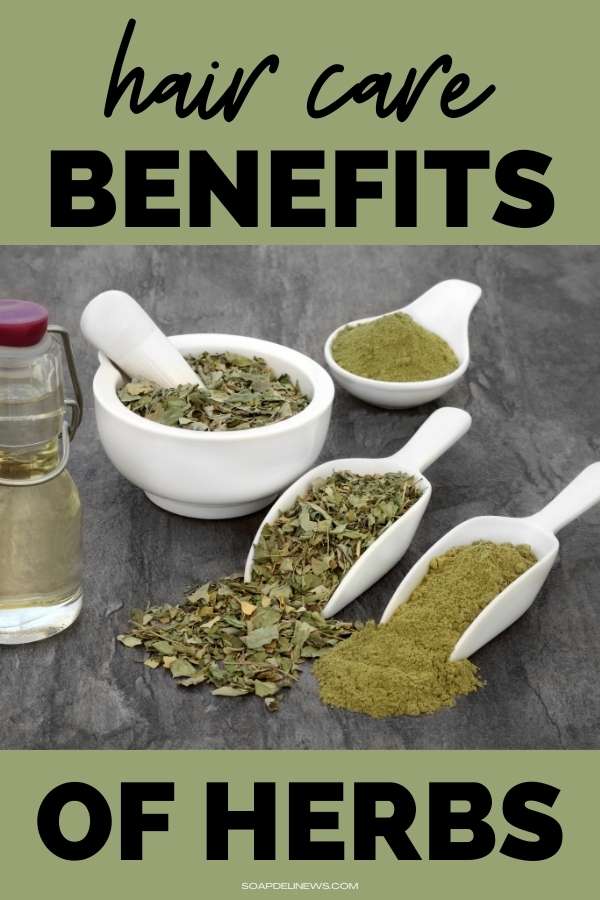
Why I Use Herbal Hair Care Products
Herbs make a wonderful addition to your hair care routine. So much, in fact, that even commercial hair care brands are adding herbs and other botanicals to their products for their natural hair care benefits. Many herbs, such as henna and even aloe vera, work wonders for restoring hair health. While there are many herbs you can use to get healthy looking hair, henna, and other similar herbs, offer long lasting results.
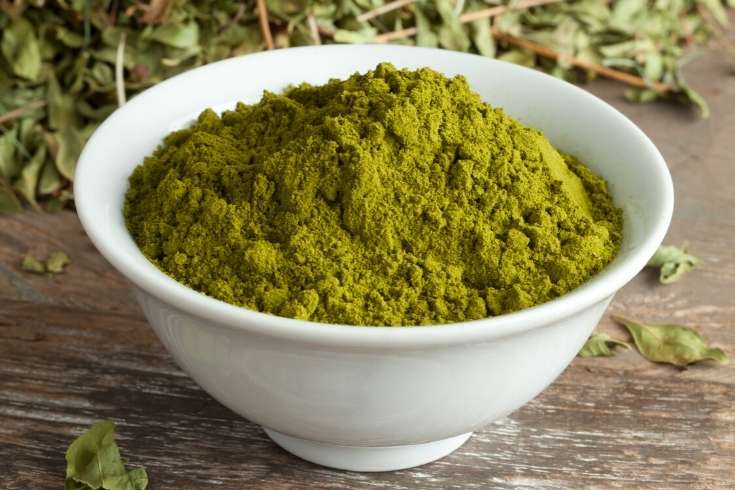
What are the Hair Conditioning Benefits of Henna?
Henna has been used on hair for centuries, and it’s gaining popularity as women are looking for more natural ways to both color and naturally condition their hair. In fact, I keep my hair feeling and looking healthy with a henna hair treatment every three months. While I primarily use henna for its hair conditioning benefits, I also use henna cover to cover my (slightly) gray hair.
I love how well henna moisturizes and hydrates my dry hair. This is especially helpful for taming frizz and flyaways as well. After a henna hair treatment, I’ve found that I don’t need to use a daily conditioner for several weeks.
The conditioning benefits of henna last so long because henna chemically bonds with hair. This not only smooths the strands and increases elasticity, it also makes each strand thicker. In turn, hair more volume. As my hair always looks fuller (and healthier!) after using a henna conditioning hair treatment, it’s become my go to natural remedy for thinning hair on females.
If you’ve never used henna to color your hair before, you will be amazed by how much it can do to restore even the driest, damaged hair in addition to adding color.
Some of the hair conditioning benefits of using henna (or other herbs) as an herbal hair care product are as follows:
- Improves Scalp Health
- Speeds Hair Growth
- Reduces Hair Loss or Fall Out
- Increases Hair Shine and Luster
- Reduces or Prevents Graying
- Improves Hair Texture
- Thickens Hair
- Increases Elasticity
If you’re interested in trying henna as part of your natural hair care routine, you can learn more about the benefits of henna for hair here. I also include information on what to expect from a henna hair treatment with before and after photos.
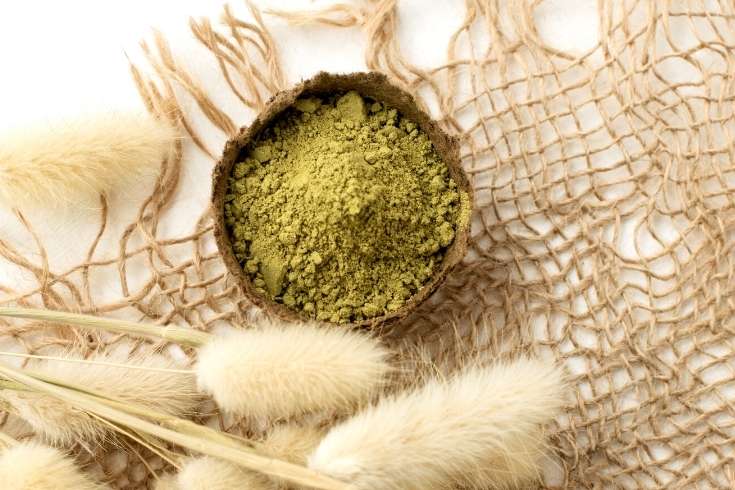
How to Boost the Benefits of Henna with an Herbal Conditioner
Although henna is wonderful on its own without adding anything, I like to add an herbal hair conditioner to my henna. I find this conditioner especially beneficial during the winter months when my hair is extra dry or unmanageable. However, it can be used any time of the year.
This deep conditioning hair treatment consists of powdered herbs chosen specifically for their benefits for both my hair and scalp. It’s very easy to add the prepared herbs to my henna before I mix it with water or tea. And I definitely notice a difference in how my hair looks and feels after using the herbs in my henna hair treatments.
While henna is best known for adding red color to hair, it actually comes in all different hair shades. By adding other botanicals, such as indigo or cassia, you can create natural looking shades from brown to black. However, if you aren’t looking to color your hair, you can still get similar benefits that henna has to offer from an herbal hair conditioner.
My herbal conditioning hair treatment is easy to make. It can be used just like a deep conditioning hair mask with or without the henna. While the results of the herbs won’t last as long as a henna hair treatment, the effects on hair are similar. Generally, you can expect the benefits of an herbal hair conditioner to last 1-2 weeks, depending on the condition of your hair.
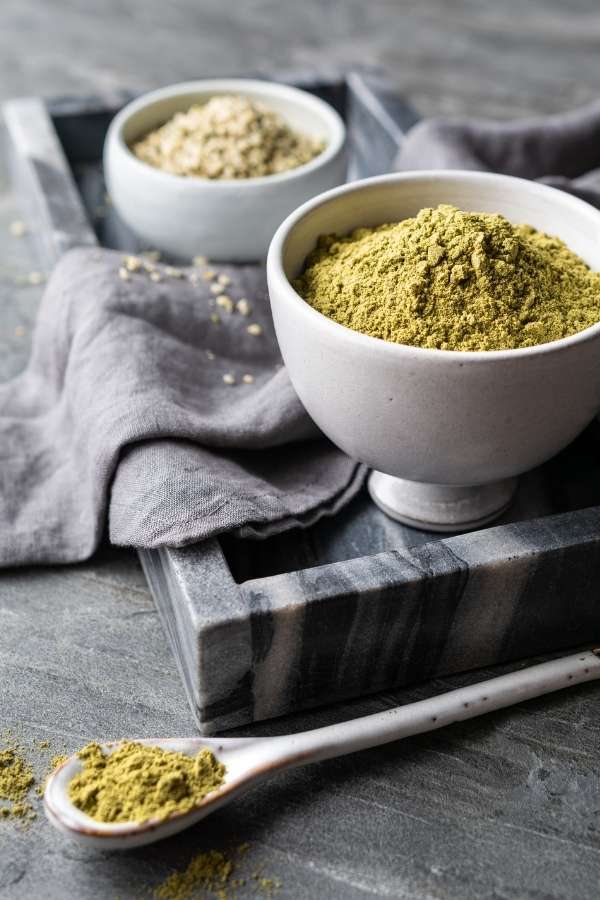
Best Herbs for an Herbal Hair Conditioner
Before I tell you how to make my herbal hair mask, I first want to share with you the benefits of the specific herbs I chose to create my herbal hair conditioner.
I’ve tried several different herbal recipes for hair care over the years. However, today I’m going to share my favorite way to use herbs today in an herbal hair conditioner recipe. This herbal blend really helps to promote hair growth. It will also make your hair luxuriously shiny and soft. And, if you have an itchy scalp or other issues, you’ll find that this conditioning hair treatment also soothes your scalp to calm itching and other skin related issues.
There are a number herbs that have benefits for your hair. I like to create a mix of herbs to use to get the benefits of each one for the ultimate herbal hair conditioner recipe. You can use fewer herbs, but I recommend using most of these for the best experience.
I use all of the herbs listed below to make my herbal hair mask. You do not have to add all of the herbs that I use, but I do recommend adding as many as you can because they do complement each other and work well together. Each herb was selected for its natural hair care benefits. Even though several of these herbs offer similar benefits, they do work in different ways. The herbs I used to make my herbal hair conditioner are as follows.
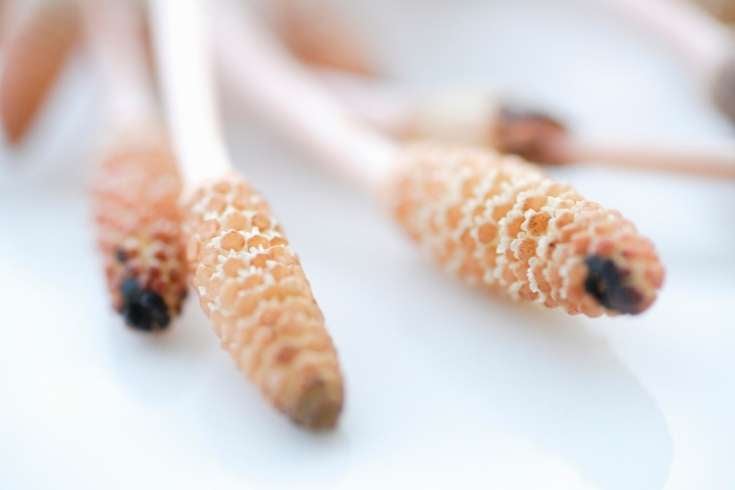
Horsetail for Hair Growth
Horsetail has been used for herbal hair care since the ancient Greeks and Romans. It’s naturally high in silica. Silica helps increase the thickness of your hair, and it also helps strengthen hair to reduce breakage.
Horsetail is also said to stimulate hair growth due to its antioxidants. It can also improve circulation in the scalp, which can lead to hair growth. Increased blood flow in the scalp can improve scalp health and improve the hair follicles for healthier looking hair.

Yellow Dock for Scalp Health
Yellow dock isn’t a commonly used herb, but it has many benefits for your scalp, which can improve your hair health. It’s naturally anti-inflammatory and anti-bacterial. If your scalp is irritated or there is bacteria on your scalp, this herb can improve your scalp health.
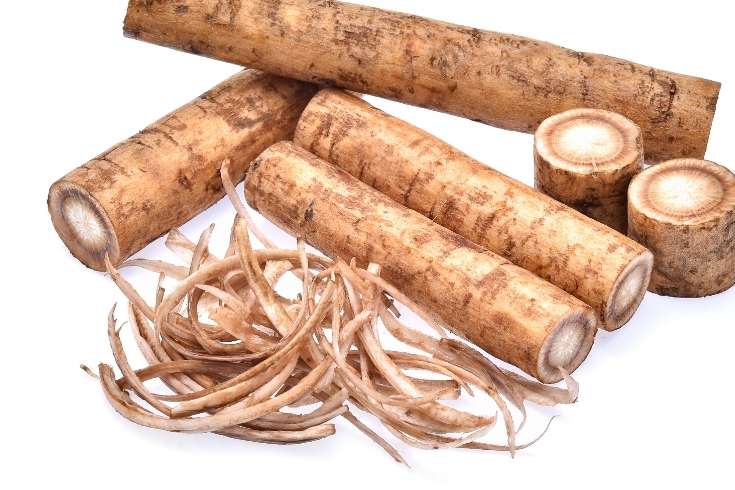
Burdock Root to Strengthen Hair
Burdock root is often used for skin conditions, and I also use it for my hair. It contains amino acids and essential fatty acids that can strengthen the hair. It’s high in vitamin A to strengthen the hair and nourish your scalp for better looking hair with long term use.
Burdock root is also naturally anti-inflammatory and antimicrobial. It helps reduce inflammation from an irritated scalp and can kill germs that live on the scalp for healthier looking hair.
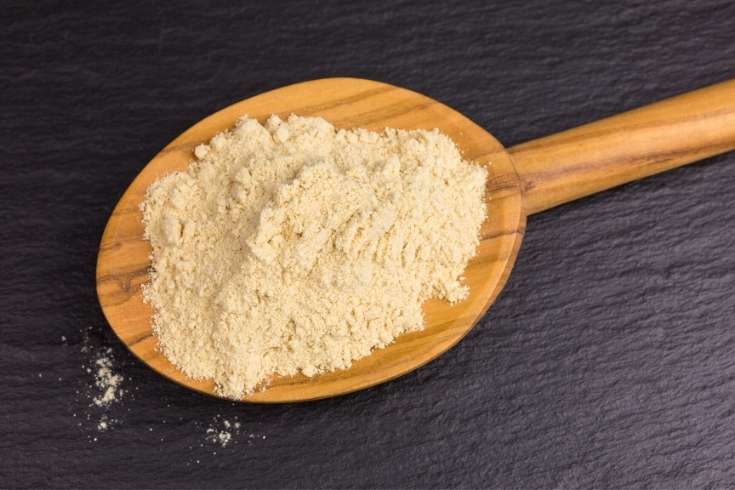
Marshmallow Root for Soft, Manageable Hair
If I had to choose just one herb for hair, it would be marshmallow root. Marshmallow root is a unique herb in that it creates mucilage when it gets wet. Mucilage is a gel substance that is very slippery when it’s wet. It’s high in proteins and vitamins that help improve hair hair. This also provides slip on your hair, which makes your hair look and feel softer and helps prevent tangles. And one of the reasons why it’s a common ingredient found in a hair detangling spray.

Hibiscus for Hair Growth
Many people use hibiscus to encourage hair growth. It’s said to help hair grow longer and increase the number of hair follicles for longer and thicker hair. Hibiscus is high in vitamin C, which can promote collagen production for healthy hair. It also balances scalp pH and stimulates hair growth by supporting scalp health.
For your hair, it also helps prevent split ends and reduces graying hair. It’s an excellent herb for oily hair because it can reduce excess oil to keep hair looking soft. It acts like an emollient, drawing moisture to the hair to make hair look and feel smoother. It also leaves a film of sorts on your hair that smooths your hair.
Hibiscus can add a warm red tint to your hair. If you have blonde hair or don’t want a reddish tint, then omit this herb from your herbal hair conditioner.
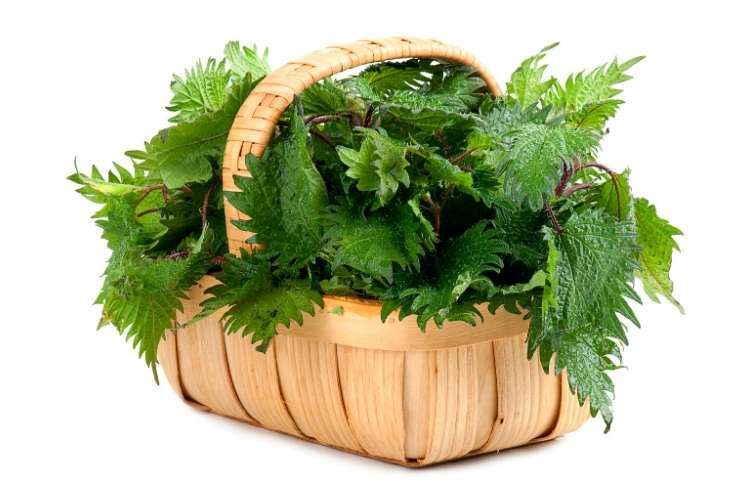
Stinging Nettle for Hair Growth
Stinging nettle is said to boost blood circulation in the scalp. This helps get nutrients and oxygen to the scalp to boost hair growth. It’s also high in antioxidants to combat damage to the scalp that can lead to hair loss.
Stinging nettle is also said to stop the formation of DHT. DHT is a hormone that both men and women produce that can lead to hair loss.
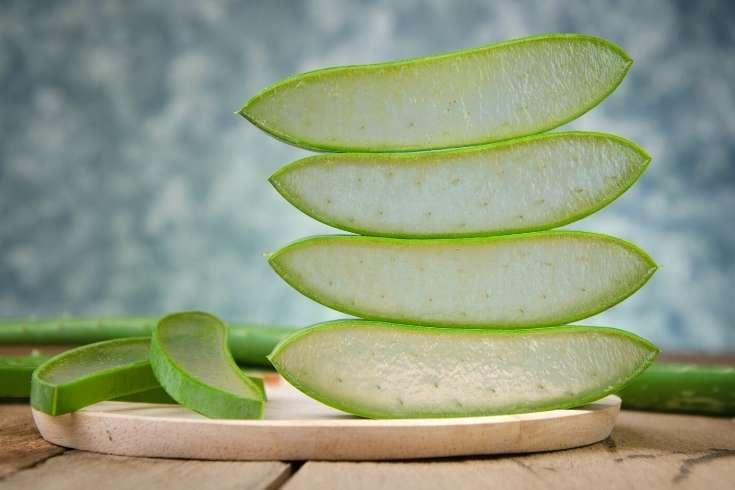
Aloe Vera Leaf for Conditioning
Aloe vera leaf is made from the dried leaf of the aloe plant. Aloe vera contains an enzyme that can help repair dead skin cells on the scalp to promote scalp health and thus hair health. Aloe is a wonderful natural conditioner for your hair, and it won’t make your hair greasy or oily.
Aloe has a similar composition to that of keratin, the protein that is found in your hair. Since they are similar, aloe vera can nourish the hair with vitamins and boost hair elasticity to prevent breakage and damage.
Mix It With Your Favorite Conditioner
You can use your favorite conditioner, but I like to use a deep conditioner for this herbal hair conditioner recipe. A few of my favorites are this Honey and Sage Deep Conditioner, Eden Bodyworks Jojoba and Monoi Deep Conditioner and this Rooted Beauty Hydrate & Nourish Conditioner for Dry & Dull Hair. All of these hair conditioners are made with natural ingredients that offer deep conditioning for your hair. They are free of chemicals, waxes and silicones that only make hair look better temporarily by leaving a film on your hair.
No matter which conditioner you use to make your herbal hair conditioner recipe, it’s important to leave it on for half an hour. I wash my hair, towel dry it for a few minutes then mix the conditioner and apply it. I put my hair in a shower cap and use a microwavable deep conditioning hair cap. The heat opens the cuticles in your hair so the conditioner and herbs work better by penetrating into the hair shaft and delivering the vitamins, minerals and proteins inside the hair shaft where it goes to work to nourish your hair and make it stronger.
Can I Use this Herbal Conditioner If I Have Blonde Hair?
This herbal hair conditioner is suitable for all hair types and colors. However, it is important to note that hibiscus can turn your hair a reddish hue. Therefore, I don’t recommend using this recipe as is if you have blonde hair and don’t want a red tint.
In that case, simply omit the hibiscus from the hair mask recipe. You don’t need to substitute it with anything else, unless there’s simply another herb you’d like to try, or that provides additional results that you’re seeking.
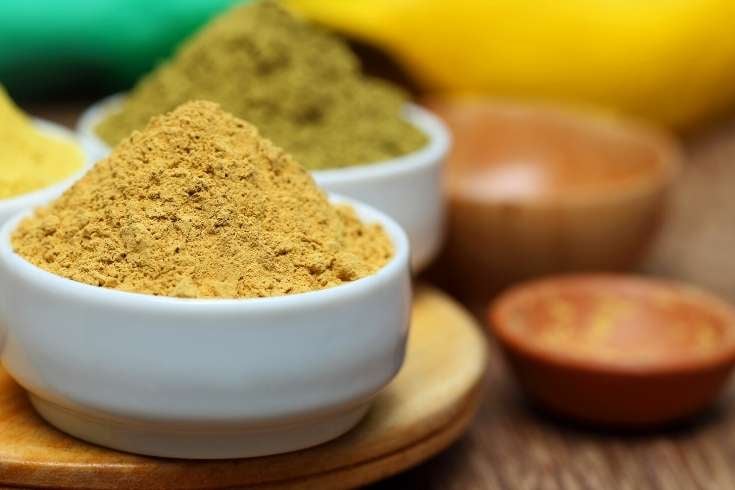
How to Store an Herbal Hair Treatment
Since this is a dry mix of herbs, I can make several batches at once to save time. I store leftover herbs in a container in my cupboard for up to 3 months. Then when I want to make this herbal hair conditioner recipe as a deep conditioning treatment or in a henna treatment, it’s ready to use without any additional prep work.
Alternately, you can also store this deep conditioning hair treatment in the freezer for over a year. It simply needs to be sealed in an airtight container.
How Often Should I Use an Herbal Hair Conditioner?
I use the herbal conditioner recipe in my henna treatment every few months when I color my hair with henna. As the benefits of henna last up to 3 months, I find that I need to use this conditioner every 3 to 4 weeks between color treatments.
However, if you don’t use henna as a natural conditioner or hair colorant, you can use this herbal hair conditioner solo whenever hair gets dry, dull or hard to manage
I recommend using this herbal conditioner once a week if your hair is a big challenge for you and you’re dealing with a lot of damage. The effects of this deep conditioning hair treatment is well worth the effort, making it a worthwhile luxury while you catch up on your favorite shows. You won’t believe how soft and silky your hair is after just a single use.
Otherwise, you can use this conditioning herbal hair mask, whenever hair feels dry, dull or lifeless.
What If I Don’t Have Time to Deep Condition Regularly?
If your hair becomes dry in between deep conditioning treatments, and your busy lifestyle keeps you from taking time out to use this conditioning hair mask, then I recommend this hair oil treatment with jojoba oil. Just a few drops on dry hair will restore hair’s luster and shine, and moisturizes dry locks. This recipe, which was formulated by Nightblooming on Etsy, also sells similar hair oil blends that you can buy.
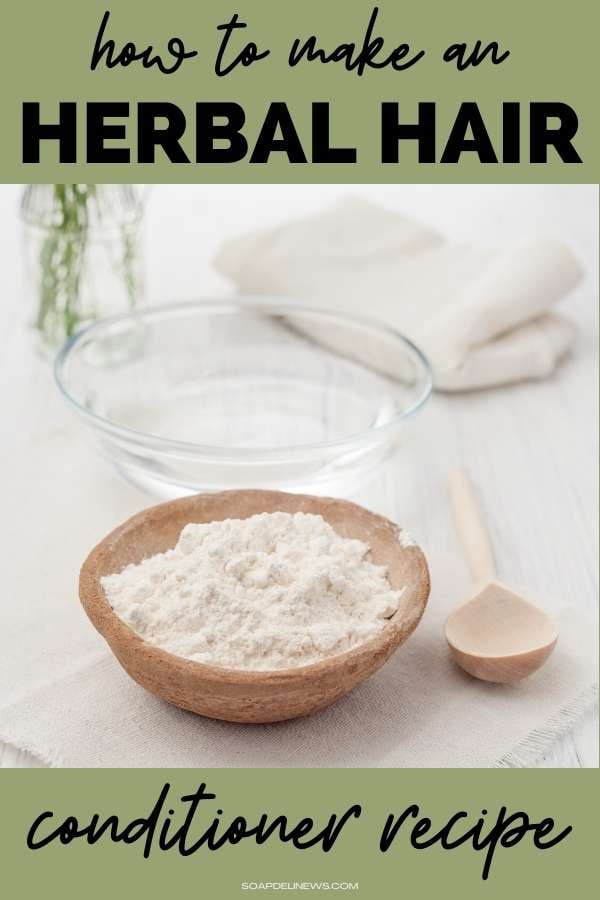
Herbal Hair Conditioner Recipe
Ingredients:
1 part horsetail powder
1 part yellow dock root powder
1 part burdock root powder
1 part marshmallow root powder
1 part hibiscus flower powder
1 part nettle leaf powder
How to Make A Deep Conditioning Hair Treatment
Mix equal parts of the powdered herbs together. (I usually use 1/4 cup of each herb to make several batches of this conditioning hair treatment at once.)
Once thoroughly combined, store the powdered herbs in an airtight jar with a lid until ready to use. (These pantry jars work great!)
How to Use an Herbal Hair Conditioner
This herbal hair conditioner is so easy to use. You simply mix the powdered herbs with just enough water to form a paste. Then combine the paste with your favorite conditioner, apply to your hair like you normally do.
To use by itself, add 10 grams or about 4 tablespoons (¼ cup) of ground herbs with enough water to form a paste. (I recommend using distilled or filtered water.) Then add the paste to ¼ cup of conditioner.
Apply the herbal conditioner to clean damp hair, then let sit for 30 minutes.
Afterwards, rinse well. You may find that this treatment is a little gritty. If you have trouble washing it out, you can use more conditioner without the additional herbs.
To use this herbal hair conditioner in henna, add 10 grams or 4 tablespoons of ground herbs per 100 grams henna powder, depending on hair length. (You can adjust the amount proportionately as needed for shorter or longer hair.) Then prepare and apply the henna as usual. (Learn how to use henna here along with application tips and tricks.)
I add this herbal mixture to a conditioner about once a week, if I haven’t gotten around to using henna to condition and color my hair. Since I have to sit with it on my hair for half an hour, I don’t always get it done like clockwork. However, it does take considerably less time than henna requires.
I absolutely difference in softness and how my hair looks after I use this herbal conditioner. Therefore, I try to use that time to read a book or catch an episode of whatever show I’m binge watching on Netflix that week, but let’s be real. I usually end up with a deep conditioning treatment on my hair while I’m doing the dishes or vacuuming the living room.
Moisturize dry hair and boost hair growth with this herbal hair conditioner recipe. This deep conditioning hair mask lasts longer than a traditional hair mask and works better than your daily conditioner as a natural hair care treatment. To use, mix 4 Tablespoons of this herbal hair conditioner with just enough water to form a paste. Then combine the paste with 1/4 cup of conditioner. Apply to your hair as you normally would. Allow to set for 30 minutes. Then rinse out.Herbal Hair Conditioner Recipe

Materials
Tools
Instructions
Notes

Where to Buy Ingredients to Make an Herbal Conditioner
I prefer to buy the herbs already powdered so there’s no need to grind them down. However, if you are unable to find the herbs you need in powdered form, you can use a mortar and pestle or a coffee grinder to grind them. The coffee grinder makes quick work of turning them into a powder, however I caution against using it for coffee again because they are hard to clean.
Mountain Rose Herbs is my go to for organic herbs, free of pesticides and other harmful chemicals. They sell all the herbs needed for this herbal hair conditioner recipe in powdered form for easy one stop shopping. In addition, their products are always of the utmost quality and sustainability and fair trade are two of their leading principles.
Where Can I Buy An Herbal Hair Conditioner?
If you want to try this herbal hair conditioner but don’t want to make it, you purchase a similar version from Nightblooming on Etsy here. You’ll also find henna for sale along with other herbs with similar properties, such as senna, cassia, and indigo.
More Conditioning Hair Mask Recipes
I hope you love my deep conditioner hair treatment. I love using herbs for natural care as they offer longer lasting benefits than hair masks typically do. However, if you prefer hair masks, you can add my herbal hair conditioner blend to your own hair mask recipes to help them last longer and work better. If you’re looking for hair masks to try, then consider one of these natural conditioning hair treatments.
- Easy Hair Mask Recipes for Every Hair Type
- Hair Mask Recipe for Hair Growth
- Moisturizing Hair Mask Recipe with Essential Oils
- Hair Mask Recipe for Healthy Looking Hair
If you’re looking to lighten your hair instead of darkening it with henna, then check out my DIY hair lightener spray recipe to lighten your hair naturally with herbs and other natural ingredients. Or try this DIY hair detangler as a natural alternative for unruly hair.
Discover more natural ways to care for hair by following Soap Deli News on Facebook, Twitter, Pinterest and Instagram . Or subscribe to my newsletter for more beauty tips and ideas.



